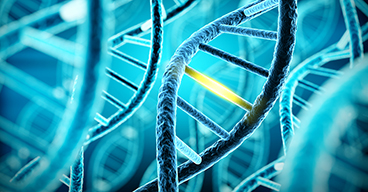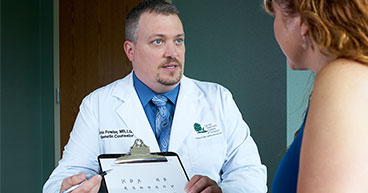
When you hear “BRCA,” you most likely think cancer. That’s because the genes have made headlines in recent years for their link to inherited cancer risks. But everyone has BRCA genes. Their job is to repair damaged DNA, keep cells healthy and protect you from cancer. The concerns arise only if you have an important genetic difference called a pathogenic variant or mutation in a BRCA gene.
Only a small percentage of people (about one in 400) carry mutated BRCA genes—specifically, mutated BRCA1 or BRCA2 genes. Most people don’t know whether they have a BRCA mutation. And they won’t know until they or a close relative is diagnosed with cancer or undergoes genetic testing. But people who have a mutation are at an increased risk for several types of cancer—most notably, breast cancer.
Knowing your BRCA mutation status may heighten your awareness about your risks for developing cancer in the future. Many other genes beyond BRCA1/2 are associated with inherited risks for cancer. The BRCA genes are usually part of a larger genetic testing panel test.
“I believe knowledge is power,” says Eric Fowler, MS, Licensed Certified Genetic Counselor at City of Hope® Cancer Center Chicago. “If there’s a genetic test result that shows an increased risk, then that information can help save a person’s life. Such a result can also cause worry and anxiety, but there’s a lot of hope wrapped up in knowing.”
In this article, we’ll explore:
- What is BRCA testing?
- BRCA gene testing results: What are the options?
- You’re BRCA positive. Now what?
- Your result is BRCA negative or variant of unknown significance. Now what?
If you’ve been diagnosed with cancer and are interested in a second opinion, or if you’re concerned about your cancer risk, call us or chat online with a member of our team.
What is BRCA testing?
Most breast cancers aren’t considered genetic. In the United States, in fact, only about 5 to 10 percent of breast cancers are associated with an inherited gene mutation. Of those, about half are linked to a BRCA1 or BRCA2 mutation. Genes beyond BRCA1/2 should also be included in genetic testing, as ordered by the medical provider coordinating testing.
If your medical provider refers you for genetic testing for the BRCA1/2 and other genes, it’s likely because:
- You’ve been diagnosed with breast cancer, ovarian cancer, prostate cancer or pancreatic cancer.
- You have a significant family history of cancer which may include cancer diagnoses at earlier ages, multiple relatives with cancer, or cancer in multiple generations.
- You have Ashkenazi Jewish heritage, which is associated with a higher chance to have a BRCA1/2 mutation.
- A family member has tested positive for a BRCA1 or BRCA2 gene mutation.
The National Comprehensive Cancer Network (NCCN) recommends genetic testing of BRCA1 and BRCA2, as well as many other genes, based on specific medical criteria. Typically, insurance companies will cover the genetic testing if you meet these criteria. The genetic testing process often starts with a referral to a genetics provider, such as a genetic counselor. Some physicians and advanced practitioners may also coordinate testing from their offices. If insurance companies do not cover genetic testing for inherited cancer risks, self-pay options are available at around $250.
Because healthy cells are needed for testing, a blood or saliva sample is obtained, which is then sent to a genetic testing laboratory to search for any differences or changes in the genes.
BRCA gene testing results: What are the possibilities?
It may take a few weeks for your genetic test results to come back. Once they’re in, you’ll likely discuss the results or meet with your genetic counselor or provider to review them.
Your genetic test results could be:
- Positive – An important genetic difference called a pathogenic variant or mutation is detected that causes an inherited and increased lifetime risk for certain cancers
- Negative – There were no genetic changes or differences detected, big or small, which greatly reduces the chances of an inherited risk for cancer
- Inconclusive/Uncertain – A variant of unknown/uncertain significance (VUS) was detected, which means a genetic difference was detected that has an unknown effect on cancer risks
BRCA positive
If your test finds an important change, called a pathogenic variant or mutation, this impacts the ability for the gene to work as it should and cancer risks are increased— this is considered a positive result.
“Pathogenic mutations cause increased and inherited risks for cancer,” Fowler says. “Medical management is tailored to the specific gene and associated cancer risks, as well as the family history of cancer.”
When a genetic test result is positive, earlier and increased cancer screenings, options for cancer risk reduction, and genetic testing for family members are important topics to review with medical providers.
BRCA negative
Sometimes genetic tests show no genetic differences at all. That’s considered a negative test result, meaning that no genetic changes—large or small—were found on the test, and you have a greatly reduced chance to have an inherited risk for cancer.
Yet even if the test is negative, if you have a family history of cancer, your provider or genetic counselor may recommend earlier and/or more frequent cancer screenings.
“Family history is still an important tool to help guide medical management even when there’s not an identified inherited cancer risk found on genetic testing,” Fowler says.
Also, not having an inherited risk for cancer/a pathogenic mutation found on genetic testing doesn’t mean someone else in your family doesn’t have such a risk. It just means you didn’t happen to inherit it.
Variant of unknown significance (VUS)
In addition to positive and negative genetic test results, you can also have uncertain or inconclusive results where a variant of unknown, or uncertain, significance is found. These genetic differences, usually referred to as VUS are gene changes that could either cause inherited cancer risks or be benign and have no impact on cancer risks. Most genetic testing laboratories update the medical provider and patient if there is new information about whether a VUS is meaningful or not.
You’re BRCA positive. Now what?
If you learn you tested positive for a BRCA gene pathogenic variant or mutation, it doesn’t mean you definitely will develop cancer. You should, however, consider your options for cancer screening and cancer risk reduction with the help and guidance of your provider. A positive genetic test result and the family history of cancer should both be used to guide cancer screening and risk reduction.
The National Comprehensive Cancer Network (NCCN) sets medical management guidelines on how to manage cancer risks linked to a positive genetic test result. For example, if a woman tests positive for a BRCA gene mutation, according to the NCCN, she should have awareness of and familiarity with her breast tissue starting at age 18. Clinical breast exams performed every six to 12 months and annual breast MRI starting at age 25. At age 30 annual mammograms should be performed at the six-month point between breast MRIs.
Risk-reducing bilateral mastectomy, a surgery to remove breast tissue often followed by surgical breast reconstruction is a consideration for women with BRCA mutations. “Such a surgery to reduce breast cancer risks is a personal decision,” Fowler says, “and options should be discussed with a breast surgeon.”
Men who test positive for a BRCA mutation, Fowler says should have clinical breast exams performed once a year starting at age 35, receive education from a medical provider about techniques for breast self-exams and perform them regularly, and mammograms may be performed starting at age 50.
Women and men with BRCA mutations should report to medical providers any changes in their breasts, such as a new lump, nipple discharge/changes in nipple position, breast asymmetry, or skin redness or skin texture changes on the breasts.
“Breast awareness and breast self-exams are important,” Fowler says. “Reporting breast changes to medical providers can lead to cancers being detected at earlier stages which can result in better treatment outcomes.”
Testing positive for a BRCA gene mutation doesn’t just have implications for breast cancer risk. It increases the risk for other types of cancer, as well, including:
- Ovarian cancer
- Peritoneal cancer
- Fallopian tube cancer
- Pancreatic cancer
- Prostate cancer
- Melanoma
Recommendations for cancer screening and risk reduction for people with inherited risks for cancer can change over time. It is important to check in every one or two years with medical providers to learn if there are any updated medical management guidelines.
Your result is BRCA negative or variant of unknown significance. Now what?
Talk to your genetic counselor or medical provider about what your specific results mean. He or she may recommend further testing or advise earlier or more frequent cancer screenings based on your personal or family history of cancer. It may be reasonable for other relatives to have genetic testing – there could be an inherited risk for cancer in your family that you did not inherit.
Remember, though, that family history can change over time. If there are any new cancers diagnosed in the family, reaching out to the medical provider who coordinated your genetic testing is advised in case additional testing would be recommended.
Also remember that genetic testing continues to evolve as scientists discover new genes and develop new genetic testing techniques.
“Even if you’ve had genetic testing in the past, genetic testing should be revisited it with your genetic counselor or other medical provider every few years to learn if updated testing is available or should be considered,” Fowler says.
If you’ve been diagnosed with cancer and are interested in a second opinion, or if you’re concerned about your cancer risk, call us or chat online with a member of our team.



